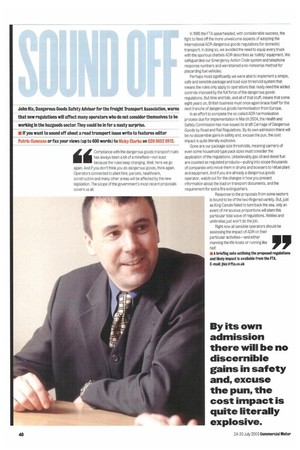dd Compliance with the dangerous goods transport rules
Page 40

If you've noticed an error in this article please click here to report it so we can fix it.
has always been a bit of a minefield—not least because the rules keep changing. Well, here we go again. And if you don't think you do dangerous goods, think again. Operators connected to plant hire, parcels, healthcare, construction and many other areas will be affected by the new legislation. The scope of the government's most recent proposals covers us all. In 1995 the PTA spearheaded, with considerable success, the fight to fend off the more unwelcome aspects of adopting the International ADR dangerous goods regulations for domestic transport. In doing so, we avoided the need to equip every truck with the spurious chattels ADR describes as 'safety' equipment. We safeguarded our Emergency Action Code system and telephone response numbers and we retained a no-nonsense method for placarding fuel vehicles.
Perhaps most significantly we were able to implement a simple, safe and sensible package and load-size threshold system that means the rules only apply to operations that really need the added controls imposed by the full force of the dangerous goods regulations. But time and tide, and all of that stuff, means that some eight years on, British business must once again brace itself for the next tranche of dangerous goods harmonisation from Europe.
In an effort to complete the so-called ADR harmonisation process due for implementation in March 2004, the Health and Safety Commission has now issued its draft Carriage of Dangerous Goods by Road and Rail Regulations. By its own admission there will be no discernible gains in safety and, excuse the pun, the cost impact is quite literally explosive.
Gone are our package-size thresholds, meaning carriers of even some household-type pack sizes must consider the application of the regulations. Unbelievably gas oil and diesel fuel are counted as regulated products—pulling into scope thousands of companies who move them in drums and bowsers to refuel plant and equipment. And if you are already a dangerous goods operator, watch out for the changes in how you present information about the load on transport documents, and the requirement for extra fire extinguishers.
Response to the proposals from some sectors is bound to be of the two-fingered variety. But, just as King Canute failed to turn back the sea, only an event of miraculous proportions will stem this particular tidal wave of regulations. Wellies and umbrellas just won't do the job.
Right now all sensible operators should be assessing the impact of ADR on their particular activities—and either manning the life-boats or running like hell!
• A briefing note outlining the proposed regulations and likely impact is available from the FTA. E-mail: jhbvilta.co.uk




























































































































































